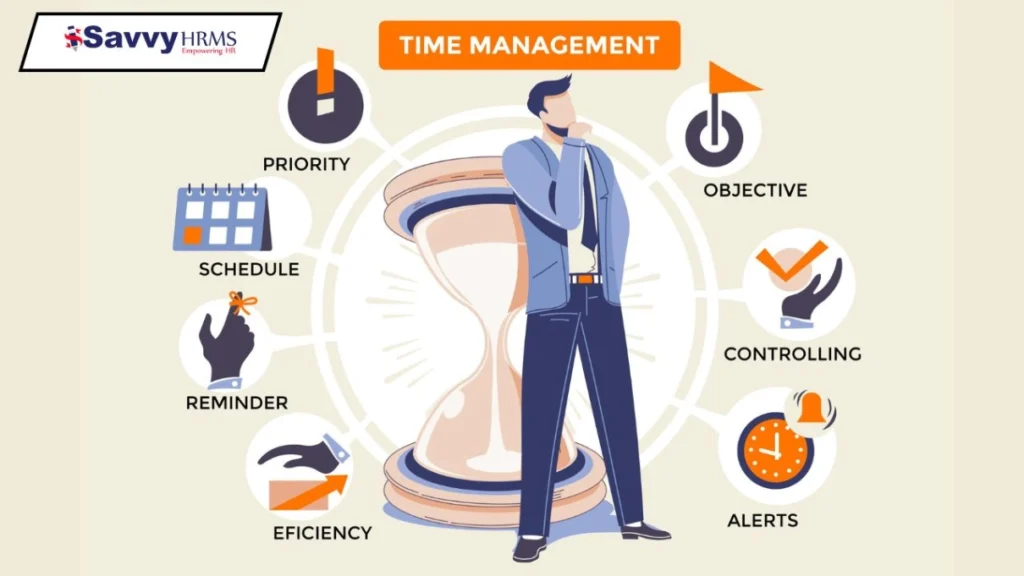It is a crucial thing in any work environment. But even more so in this age of fast-paced workplaces. That, without proper time and attendance management, employee performance suffers. And productivity can hardly be optimized. Whether it’s time management at the project level. Team level, or personal productivity level. The big game changer is how you spend your time.
Everything you need to know about time management. From proven techniques to practical tools. To a breakdown of what common time-wasters are and how to fix them:
Definition of Time Management
Time management is the planning and control. It is the organization of the days. And keeping time available later for rest, reflection, and personal well-being.
For one, effective time management gives you the opportunity to accomplish more. In a given time than the average person would be able to do. Because of time pressure, but at the same time, it creates a higher return in results.
The Importance of Time Management
Effective time management today may no longer be optional. It is the requirement. Here are the reasons making it a phenomenal factor:
1. Increased Productivity
Properly organizing your time helps you prioritize important tasks.
2. Reduced Stress
No longer do you panic about finishing everything at the last minute and missing deadlines.
3. Higher Quality Work
Rather than multi-tasking. Work on a single thing first.
4. Improves Decision Making
Knowing what is urgent and what is not. It helps you differentiate between acts that should be done, helping you make smarter choices.
5. More Opportunities
Eventually, managing time gives an individual the mental scope. And calendar space for taking on new initiatives or learning experiences.
Important Strategies for Time Management
While time management strategies are relative. Several basic methodologies can help individuals discover what works best for their style and workflow.
1. The Eisenhower Matrix
This is a method for dividing activities into four categories. It is according to the importance it holds:
Urgent and important – Do it now
If it’s important but not urgent, then schedule it for later
Urgent and not important – You might delegate it if you can
Not urgent and not important – Eliminate
2. Pomodoro Technique
You have 25 minutes of completely focused work with a 5-minute break to follow. After completing four of these. You should take a longer break of anywhere between 15 and 30 minutes. This is good for productivity and prevents burnout.
3. Time Blocking
You should divide your day into segments. And it should be allocated to a single thing or type of activity. In this way, one doesn’t multitask and devotes attention to one thing at a time.
4. The Two-Minute Rule
This way, clutter on one’s task list is avoided while saving a lot of time over the long run.
Common Time Wasters vs. Practical Solutions in Time management
Hidden time-wasters disrupting productivity plague many who even have good techniques. Some common time-wasting activities with resolution options are summarized in the following table.
| Time Waster | Why Is This A Problem? | Simple Solutions |
| Constantly checking emails | Interrupts focus and lessen deep work | Process emails at set times in the day |
| Multitasking | Decreases concentration, increases mistakes | Employ time blocking to get your focus on one task at a time |
| Unclear priorities | Poor task choices, procrastination | Use the Eisenhower Matrix |
| Procrastination | Delays important work, raises last-minute pressure | Chunk down tasks into manageable steps |
| No daily planning | Equal wasting time and disorganisation | Prioritise the to-do list |
Consequences of Poor Time Management
These consequences can be witnessed in individuals. And professional spheres of your life. Below are the negative aspects of failure to manage time in your life:
1. Missing Deadlines
Without a plan and time allocation, it leads to missed deadlines. That would mostly result in annoyance. Stress and sometimes a bad reputation in your professional circle.
2. Stress Burnout Increases in Time management
If the most is piled up. Then, one should never forget the proper maintenance of the schedule. Because the pile always causes stress. When work intensifies, in pressure to complete for one thing.
3. Diminished Quality of Work
When time allocation is inadequate, and results in rush work. Then the quality is poor.
4. A Missed Chance in Time Management
Failure to prioritise one’s time can miss valuable chances, whether for career advancement. Or a personal project-or even quality time spent with friends and family.
5. The Relationship Gets Strained
Being always late, not showing up at an appointment, or just not managing commitments. This can ruin relationships with colleagues, clients, or even family members.
Such negatives can never happen in one life. If there is an adoption of good time management that organizes. Focuses and controls one’s time.
Pragmatics of Time Management
Beyond techniques and tools. Personal habits will play a very important role in time management. Here are simple tips:
Set SMART Goals
- Specific
- Measurable
- Achievable
- Relevant
- Time-bound
Plan the upcoming day before; it will lessen decision fatigue in the morning
Don’t Multitask
Just focus on one assignment at a time, and you’ll see better results
Set a timer or use an app to keep you on track
Especially during deep work
Short breaks to reset
A refreshed mind works faster and smarter
Reflect on the week
Find what’s working, and find what needs adjustment.
Conclusion
Time management is not just about staying busy. It is how you spend your time. Once you start incorporating strategies. You will find yourself becoming clearer, less stressed, and ultimately more successful. In both professional and personal settings.
FAQs
What is the main intention of time management?
The purpose of time management is to allow individuals and teams. To use their time efficiently, thus being more productive. Meeting deadlines and reducing stress.
What can I do to stop procrastinating?
First, break the larger tasks into smaller tasks. Use the Pomodoro technique, and create accountability with deadlines for yourself.
Does good time management help improve mental health?
Absolutely. The steadiness given by time management counters feelings of being overwhelmed. It creates a kind of skeleton for structuring daily activities.
Should I program my day down to every hour?
Not necessarily. Time blocking is a good approach, but be flexible too. The aim should be structure, not rigidity.
What is the easiest way to start time management?
Every day, start with a clear list of three top priorities. That much alone can create clarity and focus in your working process and also enhance hr management.




